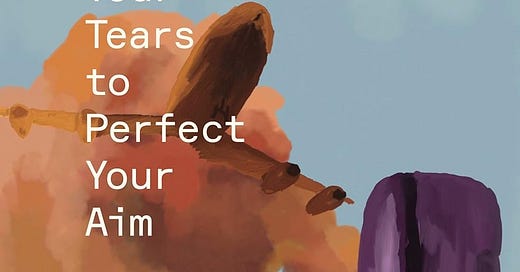In Dry Your Tears to Perfect Your Aim, a writer longing for an experience that will take him outside himself visits a war-torn country and suffers consequences he fully expected and others he never saw coming.
The narrator of Jacob Wren’s provocative anti-war novel, who remains unnamed throughout the book, makes the trip knowing from the outset that it’s a “mistake” he will probably regret. But he is driven to act: first, out of guilt because his country is the aggressor and he can’t help but feel complicit; and second, out of curiosity because the machinery of war doesn’t come cheap and he wants to see first-hand how his tax dollars are being spent.
“…a courageous, alarming and utterly original work of fiction.”
The geography of the novel is hazy, but the reader assumes that the distance between the narrator’s country and the one he’s visiting (often referred to as “the thin strip of land”) is not great. The narrator’s plane lands, a friend picks him up, and together they enter the other country, where despite the ongoing conflict the friend still lives. She’s offered her help because he’s asked, but she strongly disapproves of his reasons for being there (she says he is “stupid” and “misguided”). In fact, while he’s with her they argue almost constantly, the narrator trying half-heartedly to defend his actions, the friend poking holes in his reasoning. This section ends with the narrator leaving the friend’s apartment in the middle of the night and, naïve and ill-prepared, making his way on foot into the conflict zone.
In the sections that follow, the narrator lives through a succession of distressing and violent events—a modern-day rite of passage—that sees him shot at, fleeing falling bombs, abducted and thrown into the trunk of a car, rescued and brought into a community of idealistic resistance fighters, captured and tortured, and finally freed to make his way home. The action is spread over roughly a year.
Much of what we read in Dry Your Tears to Perfect Your Aim is internal monologue, the narrator observing in minute detail what’s happening around him. He questions the morality of his actions, wonders at his motives, records his thoughts in the aftermath of trauma, and speculates on the states of mind of the people with whom he finds himself, both friend and foe. He describes what it is like to live and work and even entertain hopes for the future under a pervasive threat of annihilation, and comments upon his attempts to connect with and make sense of a group of women constructing, from the ground up and out of the rubble of a country under attack, a self-sustaining, environmentally responsible, egalitarian society. After his capture, we see him struggle to understand the forces that motivate people who make a living and seem to enjoy inflicting pain on other human beings.
Along the way, there are lengthy ruminations on the morality of war and the possibility of remaining an objective, non-partisan observer of other people’s suffering. The narrator constantly doubts and second-guesses himself, acknowledging the folly of his actions, admitting that, as an outsider, understanding is probably beyond his realm, but finds solace in the belief that his acts of witnessing and recording are vital.
In Dry Your Tears to Perfect Your Aim, Jacob Wren has written a courageous, alarming and utterly original work of fiction. The ethical conundrums it addresses are myriad and relevant, and while it offers no solutions, it is relentless in its exposure of unflattering human truths that many of us, given a choice, would prefer to avoid.
About the Author
JACOB WREN makes literature, performances, and exhibitions. His books include Revenge Fantasies of the Politically Dispossessed; Polyamorous Love Song (finalist for the Fence Modern Prize in Prose and a Globe and Mail best book of 2014); Rich and Poor (finalist for the Paragraphe Hugh MacLennan Prize for Fiction and a Globe and Mail best book of 2016); and Authenticity is a Feeling. He is the artistic co-director of the Montreal-based interdisciplinary group PME-ART. Wren lives in Montreal.
About the Reviewer
Ian Colford was born, raised and educated in Halifax. His reviews and stories have appeared in many print and online publications. He is the author of two collections of short fiction and two novels and is the recipient of the Margaret and John Savage First Book Award for Evidence.
Book Details
Publisher : Book*hug Press (Sept. 17 2024)
Language : English
Paperback : 220 pages
ISBN-10 : 1771669047
ISBN-13 : 978-1771669047





